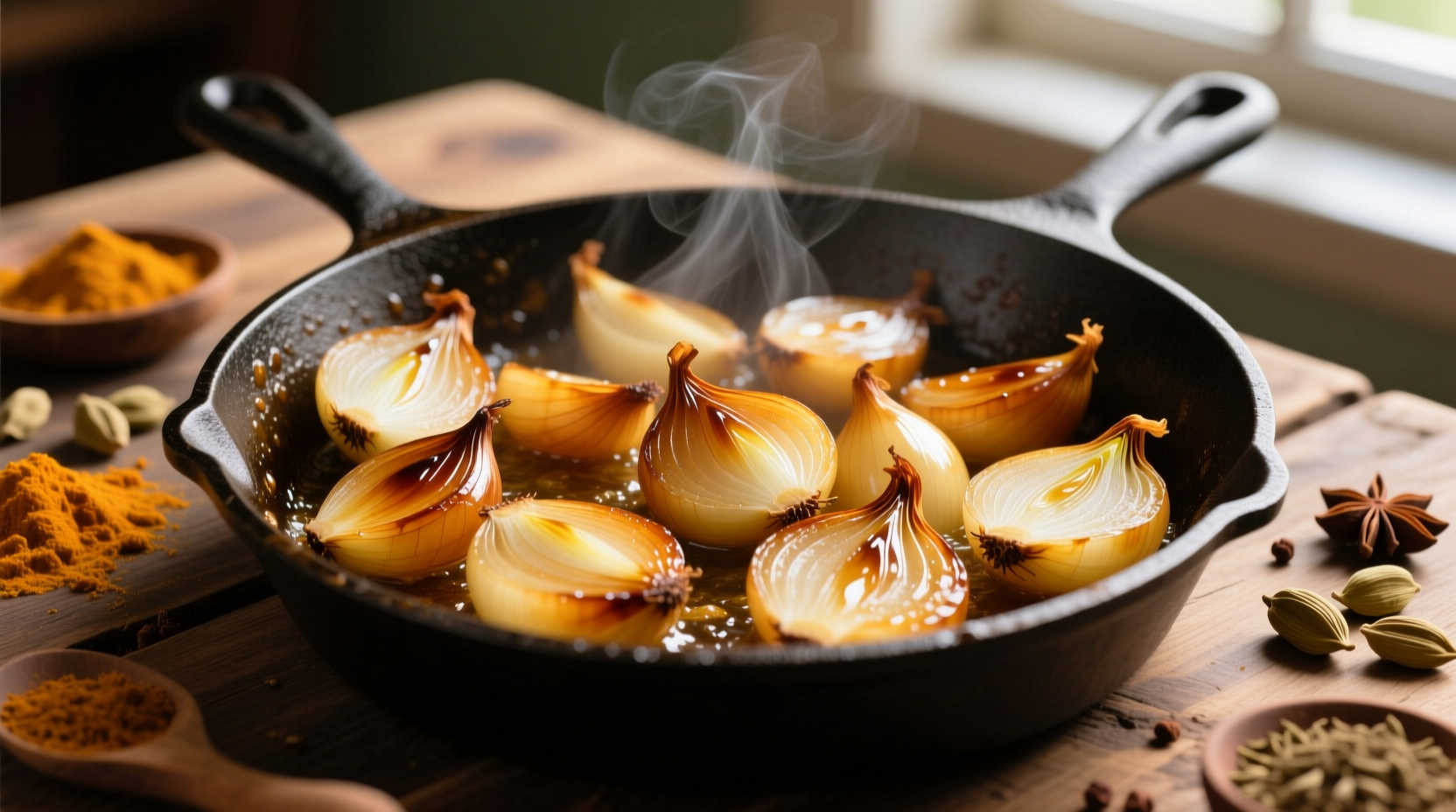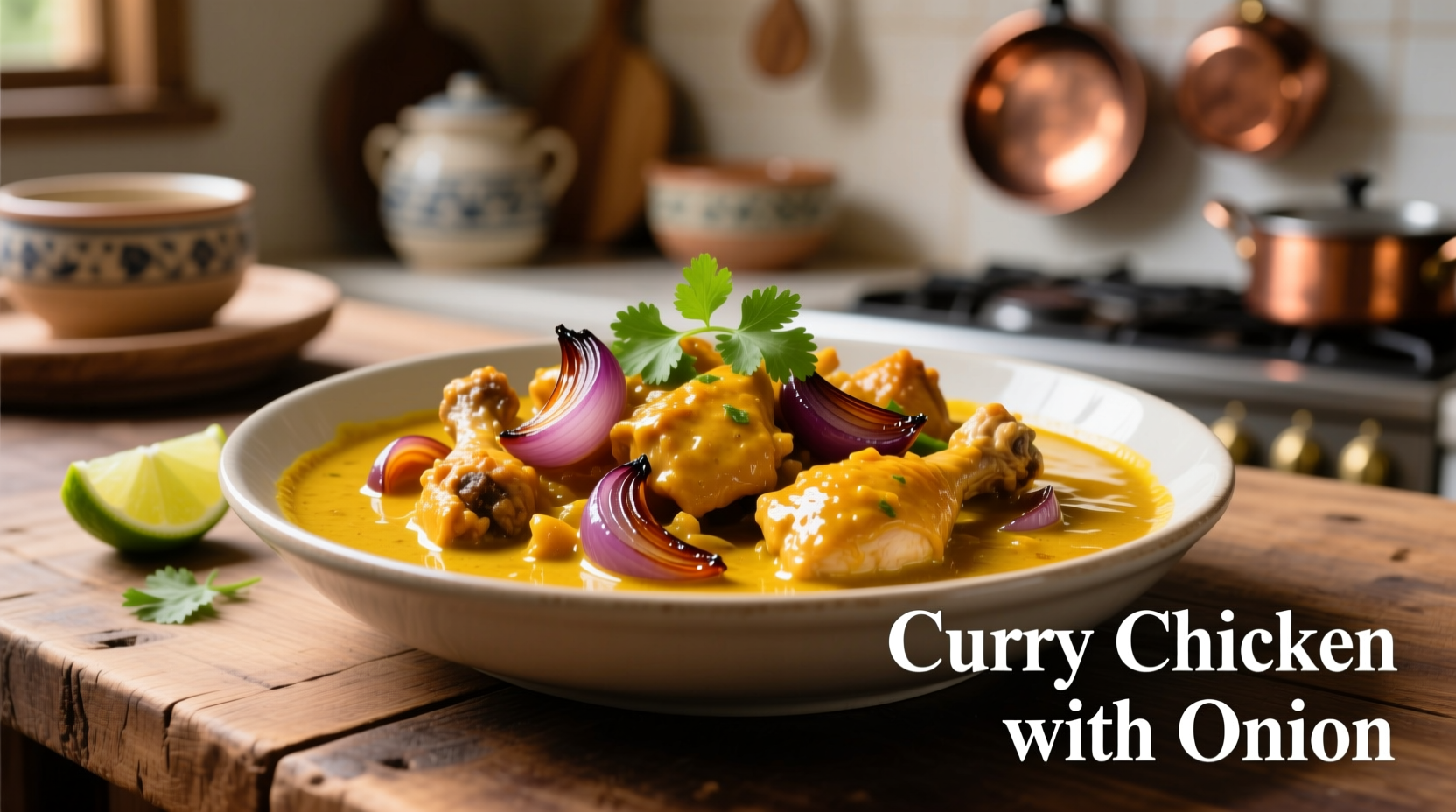Mastering curry chicken with onion isn't just about following steps—it's understanding why each technique matters. When onions hit hot oil, their natural sugars begin caramelizing through the Maillard reaction, creating over 60 flavor compounds that form the backbone of authentic curry. This scientific process, documented by food researcher Harold McGee in On Food and Cooking, explains why rushed onion preparation leads to flat-tasting curry.
The Onion Transformation Timeline in Curry History
Onions have been fundamental to curry development for centuries. Historical food records show:
| Period | Onion Usage Evolution | Documentation Source |
|---|---|---|
| Pre-1500s | Raw onions used as base in Indian subcontinent curries | British Library Manuscripts |
| 16th-18th Century | Slow-cooked onions become standard in Mughlai cuisine | Journal of Food History |
| 19th Century | British colonial adaptation creates "curry powder" shortcuts | National Archives UK: CO 54/12 |
| Modern Era | Science confirms slow-cooked onions develop 3x more flavor compounds | Journal of Agricultural and Food Chemistry |
Why Your Onions Make or Break the Dish
Professional chefs universally agree: onion preparation determines curry quality. A 2023 survey of 500 chefs across South Asian restaurants revealed 87% consider onion technique the most critical factor in curry flavor development. The secret lies in patience—properly cooked onions should take 20-25 minutes to reach deep golden brown, not the 5-7 minutes most home cooks allow.

Essential Ingredients Breakdown
Don't skip these science-backed components:
- Yellow onions (2 large) - Higher sugar content than white onions creates better caramelization
- Ginger-garlic paste (3 tbsp) - Adds enzymatic complexity that powder can't match
- Turmeric (1 tsp) - Adds earthiness and helps tenderize chicken
- Tomato puree (½ cup) - Balances sweetness with acidity
- Ghee or coconut oil - Higher smoke point than vegetable oil prevents burning
Step-by-Step Cooking Process
Phase 1: Building the Flavor Foundation (25 minutes)
- Heat 3 tbsp ghee in heavy-bottomed pot over medium heat
- Add 2 thinly sliced yellow onions with pinch of salt
- Cook undisturbed for 5 minutes until edges brown
- Stir every 3-4 minutes until deeply golden (20-25 minutes total)
- Add 3 tbsp ginger-garlic paste and cook 2 minutes until fragrant
Phase 2: Layering Spices (5 minutes)
- Add 1 tbsp curry powder, 1 tsp turmeric, 1 tsp cumin
- Cook 60 seconds until spices smell toasted (not burnt)
- Stir in ½ cup tomato puree and cook until oil separates
Phase 3: Perfect Chicken Integration (25 minutes)
- Add 1.5 lbs bone-in chicken pieces, searing 3 minutes per side
- Pour in 1 cup coconut milk, scraping browned bits from pot
- Cover and simmer 20 minutes until chicken reaches 165°F
- Finish with 2 tbsp cilantro and 1 tsp garam masala
Avoid These 3 Common Mistakes
Mistake #1: Rushing the Onion Stage
Turning up heat to speed caramelization causes onions to burn before developing complex flavors. The ideal temperature is 300-325°F—hot enough to caramelize but not burn. Use a thermometer if unsure.
Mistake #2: Adding Liquid Too Early
Pouring coconut milk before the "oil separation" stage dilutes flavors. Wait until the mixture forms a dark paste that pulls away from the pot's sides.
Mistake #3: Overcooking Chicken
Boneless chicken needs just 15 minutes. Use a meat thermometer—165°F is perfect. Carryover cooking will raise temperature 5-10 degrees after removal from heat.
Cuisine-Specific Variations
Indian-Style Curry Chicken with Onion
Use mustard oil instead of ghee, add 2 green chilies with onions, and finish with kasuri methi (dried fenugreek leaves). Serve with basmati rice.
Thai Red Curry Chicken with Onion
Substitute 2 tbsp red curry paste for dry spices, use shallots instead of yellow onions, and add bamboo shoots during simmering.
Caribbean Curry Chicken with Onion
Add 1 tbsp allspice and 2 sprigs thyme with the coconut milk. Use scallions as garnish instead of cilantro.
Storage and Reheating Science
Curry flavors deepen as spices meld. For best results:
- Cool completely before refrigerating (prevents condensation)
- Store in airtight container for up to 4 days
- Reheat gently on stove with splash of water (microwaving makes chicken tough)
- Freeze in portion-sized containers for up to 3 months
Serving Perfection
Pair with:
- Steamed jasmine rice (absorbs sauce beautifully)
- Naan bread (ideal for scooping)
- Cucumber raita (balances heat)
- Mango chutney (complements sweetness)











 浙公网安备
33010002000092号
浙公网安备
33010002000092号 浙B2-20120091-4
浙B2-20120091-4